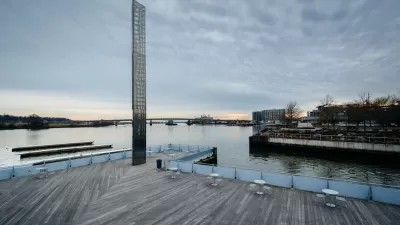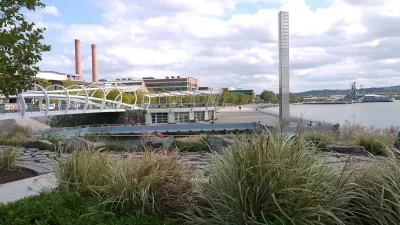A 20-year, $2.6 billion Clean Rivers Project intended to eliminate sewage discharge into D.C. area waterways will benefit the entire region. So, Carol O’Cleireacain asks, why only stick Washington's residents with the bill?
In an opinion piece for The Washington Post, O'Cleireacain, a nonresident senior fellow at the Brookings Institution's Metropolitan Policy Program, argues that because the entire region will benefit from the ambitious project being led by D.C. Water to clean up area waterways, they should be an integral part of planning, implementing and funding the cleanup strategy.
"Cleaner water flowing from the Anacostia and Potomac rivers in the District means that downstream jurisdictions have less of a pollution problem to address. Additionally, the effectiveness of water quality improvements taken by jurisdictions upstream of the District are lessened if the Potomac and Anacostia rivers become more polluted while passing through the District."
Citing regional transportation planning as a precedent for cross-jurisdictional cooperation to address regional challenges, O'Cleireacain recommends that, "The Metropolitan Washington Council of Governments and D.C. Water should bring together the federal government, the states of Maryland and Virginia, the District and local jurisdictions to sort out a more rational system of payments for the benefits from the area's clean water."
"While no one looks forward to a new cost, the current, fragmented efforts do not match the scale of the problem."
FULL STORY: D.C.’s big sewer dig: Why the whole region should pitch in

Maui's Vacation Rental Debate Turns Ugly
Verbal attacks, misinformation campaigns and fistfights plague a high-stakes debate to convert thousands of vacation rentals into long-term housing.

Planetizen Federal Action Tracker
A weekly monitor of how Trump’s orders and actions are impacting planners and planning in America.

In Urban Planning, AI Prompting Could be the New Design Thinking
Creativity has long been key to great urban design. What if we see AI as our new creative partner?

Massachusetts Budget Helps Close MBTA Budget Gap
The budget signed by Gov. Maura Healey includes $470 million in MBTA funding for the next fiscal year.

Milwaukee Launches Vision Zero Plan
Seven years after the city signed its Complete Streets Policy, the city is doubling down on its efforts to eliminate traffic deaths.

Portland Raises Parking Fees to Pay for Street Maintenance
The city is struggling to bridge a massive budget gap at the Bureau of Transportation, which largely depleted its reserves during the Civd-19 pandemic.
Urban Design for Planners 1: Software Tools
This six-course series explores essential urban design concepts using open source software and equips planners with the tools they need to participate fully in the urban design process.
Planning for Universal Design
Learn the tools for implementing Universal Design in planning regulations.
Gallatin County Department of Planning & Community Development
Heyer Gruel & Associates PA
JM Goldson LLC
City of Camden Redevelopment Agency
City of Astoria
Transportation Research & Education Center (TREC) at Portland State University
Jefferson Parish Government
Camden Redevelopment Agency
City of Claremont




























